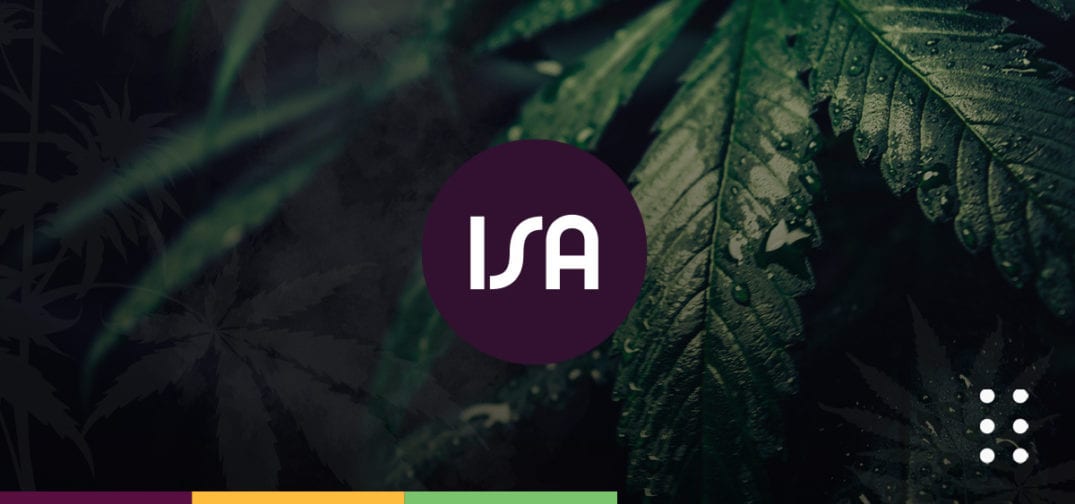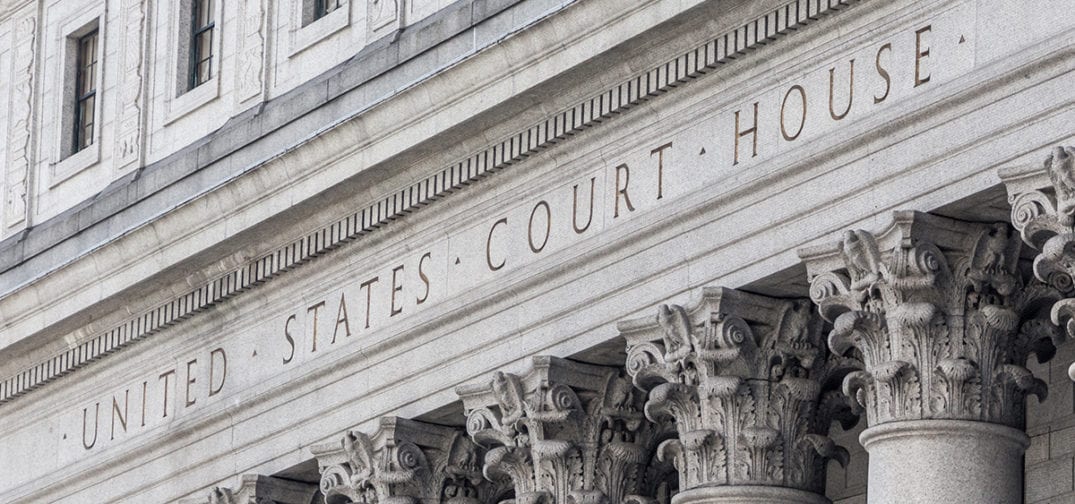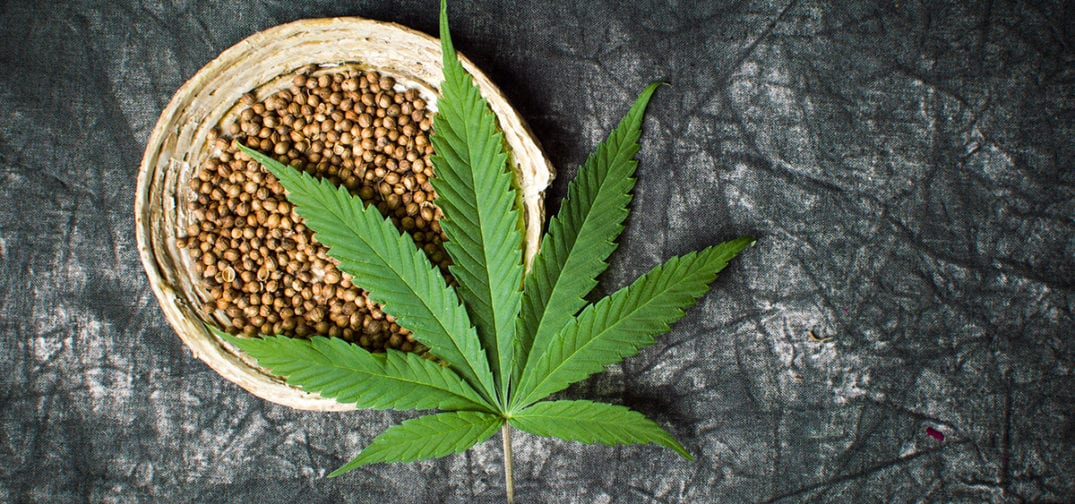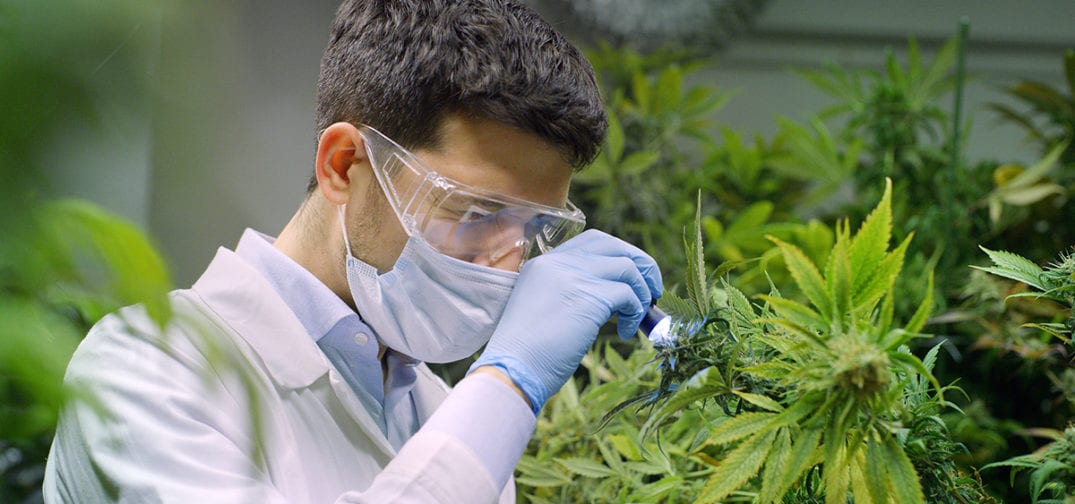New Jersey’s cannabis legalization bid was a long-sought and hard-fought victory, only achieved through the collaboration of advocates, lobbyists, and lawmakers. As President of the New Jersey CannaBusiness Association — which works to promote jobs and growth in a sustainable, responsible cannabis industry — Edmund DeVeaux was closely attuned to the process.
In this episode of the Ganjapreneur.com podcast, Edmund joins our host TG Branfalt to discuss his life and work as a cannabis industry lobbyist, New Jersey’s exciting industry prospects, and his efforts to ensure fair and balanced cannabis industry opportunities for all. This interview also covers legalization in neighboring states including New York, the nature of political compromises, his advice for budding cannabis entrepreneurs, and more!
Note: This interview was recorded after New Jersey’s cannabis legalization initiative was approved by voters and lawmakers delivered a cannabis regulations bill to the governor, but before the governor officially signed the bill into law.
Listen to the podcast:
Read the transcript:
Commercial: Ganjapreneur is excited to announce the launch of our new YouTube series, THE FRESH CUT, hosted by Cara Wietstock.
Cara Wietstock: Hi, I’m Cara Wietstock, host of THE FRESH CUT by Ganjapreneur. In this interview series, we get straight to the source and speak with the real people working in the industry. In our first episode, I spend time with Nancy Southern, whose current mission is to educate seniors on cannabinoid medicine. She lets us know how to facilitate a comfortable retail setting for older adults and provides product recommendations directly from her own experience. Catch this and all future episodes on YouTube.
TG Branfalt: Hey, there. I’m your host, TG Branfalt. And thank you for listening to the Ganjapreneur.com podcast where we try to bring you actionable information and normalize cannabis through the stories of ganjapreneurs, activists, and industry stakeholders. Today, I am joined by a very, very interesting guest. His name is Edmund DeVeaux. He’s the president of the New Jersey CannaBusiness Association. He previously served as its policy director and worked in the New Jersey Treasury Department. He was also a commissioned officer in the US Army and is also a partner at the lobbying firm, Burton Trent Public Affairs. How are you doing this afternoon, Edmund?
Edmund DeVeaux: Oh, I’m doing great, Tim. Thanks so much for having me.
TG Branfalt: It’s really a pleasure. You have such an interesting background that I want to get right into it, man. Tell me about your background and how did that bring you to the cannabis space?
Edmund DeVeaux: Oh, wow. Well, public policy is my first love and I have always been in public policy. In fact, when I say that, I even include my years as a commissioned officer because that’s public policy. You get your orders from Washington, ultimately. So, I’ve always been in public policy and spend a number of years in the private sector and in the public sector. So one day, I decided to join a very good friend of mine at Burton Trent Public Affairs. I walked in the door as its executive vice president.
TG Branfalt: Wow.
Edmund DeVeaux: You fast forward, and four years ago, Burton Trent accompanied New Jersey‘s legislative delegation out west to pick out cannabis legalization. We were with senators and members of our assembly in Colorado and in Nevada. When we came back to our Trenton office, we sat around the coffee table and we said, “Look, this is going to be big. We have to get in this in a big way. What are we going to do?” So we co-created the New Jersey CannaBusiness Association, the state’s first and largest trade association built on the cannabis industry.
But it’s funny, Tim, even before we all agreed to do that, we went home for the weekend. I always like to share this part because look, I’m not a real cannabis user and so people will question, “Well, why are you doing this?” And so, we went home over the weekend and I shared it with my daughters that I was thinking about doing this, shared it with my parents.
TG Branfalt: Wow.
Edmund DeVeaux: I even went to a dear friend who’s a member of the clergy. I said, “Look, if you don’t think that this is a good idea, please do share it and I’ll make my decisions accordingly.” And my good friend simply asked me one question. He says, “Well, why are you doing it?” And I replied, “Because I want it done right. I want it done right because I am a parent. I want it done right because I am an officer in my church. I want it done right because I am active in my community.” I can’t leave such serious policy up to just anybody, right? It’s the old adage, “If you don’t vote, you can’t complain.”
TG Branfalt: Yeah.
Edmund DeVeaux: So if I’m not part of this policymaking, then how can I complain about what occurs? That was the decision, Tim.
TG Branfalt: How did those very important people in your life react? What was the reaction? Did anyone say you’re out of your mind?
Edmund DeVeaux: No. No, in fact, it was funny. I got cool points with my youngest daughter. And so, it was my oldest daughter who followed me into the policy world, she said, “Wow, that sounds neat.” And my parents, they just said, “Look, we grew up at a time when it was reefer and you were smoking dope.” They said, “Look, if you think it’s a good idea, we like the fact that… Look, you’re our son. You’re pretty smart. Yeah, we trust you.” And when it came to asking my good friend in, in the clergy, he basically said, “Look, whether you know it or not, we’ve had members of our congregation who were cancer patients-“
TG Branfalt: Wow.
Edmund DeVeaux: “… who are seniors who got their medical cards.” And sure enough, I’m thinking back about them, we lost one or two of those members, but their last days were improved. Their quality of life was improved because of cannabis. So he was just like all over it. And so it made it simple. When we got back to the office and I think my partners were waiting for me to say I was in and I said it. So we were good to go. Thus, the New Jersey CannaBusiness Association.
TG Branfalt: When you say, “I wanted this to be done right.” What is done right look like to Edmund DeVeaux?
Edmund DeVeaux: When we look at policy and done right, first and foremost, for me being a man of color, I’m African-American for those folks that can’t see me and can’t tell by my voice. I’m African-American. And I do know because of family members and friends that were victims of the war on drugs, they weren’t victim of drugs, they were victims of the war on drugs. And I saw the unfair treatment of my friends and family. I saw what happened to certain people when they didn’t have a choice of cannabis versus other substances. So getting it done right clearly was expungement, long answer to expungement and reversal of the policies that not only demonized cannabis, but weaponized cannabis. And so, that’s getting it done, right.
But getting it done right means because I am a parent and because I am active in my community with members of the youth groups, I want to make sure that, number one, that they can wait until they’re 21 to make a reasonable decision about what substances they want to choose to use. And then when they choose, it’s got to be safe. You know, I remember back when it was really dangerous, and it’s only gotten more dangerous if you were buying your cannabis in the black market. You just really didn’t know what you were getting. It went the spectrum, Tim, from either it was weak and it was stemmy, right, or seeds and was no good.
TG Branfalt: Yeah.
Edmund DeVeaux: Or it went in the complete other direction and it was dangerous, right? Whether it was embalming fluid or something else. And so, I want it done right because I want it safe. So even if you’ve got it, God forbid, you should be a minor and somehow get ahold of it, at least we know it came from a regulated market.
TG Branfalt: You talked about the weaponization of cannabis laws and I got chills just because I am a white guy and we got away with a lot. So to hear it with such strong sort of terms is chilling to me. In the legislation that was approved, and we’ll talk about sort of where that process is kind of a mess right now, talk to me about the social equity provisions that are included in that legislation. What is the opinion of your association with regard to those proposed rules?
Edmund DeVeaux: Well, it’s funny, this was an evolutionary process. When Governor Murphy first took office back in 2017, he said, “First 100 days, right, we’re going to legalize cannabis in New Jersey.”
TG Branfalt: Yeah.
Edmund DeVeaux: Well, we got to 100 days and the 100 days turned into 200 days, turned into 365 and so on. In those early days, the conversation did circle around social equity, social justice, economic parity. And believe it or not, the early iterations of the legislation didn’t touch it. And it wasn’t until …
TG Branfalt: Wow.
Edmund DeVeaux: Well, it wasn’t until we got to this last iteration. I know a lot of people were unhappy because it didn’t quite go far enough. Look, I get that. But being in public policy in my whole life, you got to start somewhere. So fortunately, what did occur in the current legalization bill is that we do have a class of future applicants, minority, women, and veterans. So we got that in there. We got expungement in the bills as well. We got legalization up to six ounces. Then anything after that… And you’re talking about it’s something on par with a traffic ticket, right?
TG Branfalt: Yeah.
Edmund DeVeaux: We took away the criminality of the substance. So when we start talking about social equity, could it have gone farther? Absolutely. But are we angry that it didn’t go further? No, we’re not because we can always pick it up from there.
TG Branfalt: You are a lobbyist, and in this industry, that is a dirty term. What role do lobbyists have in the cannabis space and moreover, what role should they have?
Edmund DeVeaux: You know, that’s a great question because I do get that a lot especially with speaking to high school students who ask, “Well, what is a lobbyist?” Right? And so, you have the fun telling them, “Well, the term actually was generated because people were waiting in lobbies, right?
TG Branfalt: Yep.
Edmund DeVeaux: That’s how you stoke the conversation. But more importantly, and I know this is a bit of a digression, I asked people, I said, “Do you realize that you were a lobbyist by the age of two? You were negotiating for that cookie, right? You were negotiating getting that sweet. You were negotiating. And that’s what you did by the age of two, you are certified lobbyists.” And that’s what everybody is.
TG Branfalt: Waiting in the hallway.
Edmund DeVeaux: Waiting in the hallway. Right. Waiting in the doorway of that kitchen, right? So being a lobbyist, it’s all about getting to yes. It’s how do you get to yes. And that is the positive aspect of being a lobbyist, right? If the answer’s always no, then that creates challenges, it creates hurdles, it creates hard feelings. My opinion and many of the other good lobbyists, try to figure out how do we get to yes. Compromise is not a dirty word, and so you get to yes. And so, with the cannabis space, it has always been about getting to yes. It’s always been about how do we get to legalization. How do we get a medical program? How do you get to yes? You’re talking to legislators who many are my age and older who grew up thinking that all drugs are bad, right?
TG Branfalt: Yep.
Edmund DeVeaux: We have younger legislators and policymakers who were part of the D.A.R.E. Program, right? The Drug Awareness and Resistance Education. They were part of D.A.R.E. and D.A.R.E. said, “All drugs are bad.” right? “Don’t do it.”
TG Branfalt: Meanwhile, it made me more curious about them, right?
Edmund DeVeaux: Right. Yeah. So much for the D.A.R.E Program and the D.A.R.E. dog, right? So, you got that stuff going on and so in the lobby space, in the cannabis industry, we have been successful nationally by getting to yes. In over 30 states, we got to yes. In our medical programs, we got to yes. It makes sense, right? We’re getting to yes in terms of the federal government, right? You get the Sessions Memo which shocked everyone which was the successor to the Cole Memo, where even though the AG of the United States, the Attorney General of the United States says, “Back off of cannabis convictions. You’ve got better things to do.” So we’re getting it right. We’re getting to yes.
TG Branfalt: The legalization bill of course was basically approved by voters after lawmakers approved that bill to go to the ballot. Since then, it’s had an up and down. We expected it to be signed. And then it went down again when there was some issues with penalties for children or lack thereof. They put out another version of the bill. And then the sponsors, Scutari, who’s been a big player in this since the beginning, him and another lawmaker and I’m forgetting the name right now, but they pulled that bill. So where are we right now? How are members of your association weathering this legislative rollercoaster?
Edmund DeVeaux: Well, it’s interesting. Go back two years and everyone thought that it was never going to happen. We had members of the association who more or less were trying to figure out if they should stay as members of the association.
TG Branfalt: Interesting.
Edmund DeVeaux: They were saying, “Look, New Jersey isn’t going to do it. New York and Pennsylvania are going to beat us to it. We had requests for applications go out. We had applicants get held up in court. Things really weren’t looking good.” The fact that the legislature punted to the voters was still yet another challenging sign. But look, the voters overwhelmingly said, “Cannabis is a legitimate business. Get it up and running, get adult-use up and running.” So here we are, got the legalization bill passed through both houses, gets to the governor’s desk and the governor doesn’t sign it. Governor doesn’t sign it and he says, “Well, look, talking about not going far enough, you’re not going far enough with respect to making sure that there are penalties in place for minors because there are penalties if a minor gets caught with alcohol, there’s got to be penalties if a minor gets caught with cannabis.”
TG Branfalt: Yeah.
Edmund DeVeaux: We have to make it clear from the governor’s perspective. And he’s not wrong, that just because we use the term legalized, it’s not legalized for everybody, right?
TG Branfalt: Yeah.
Edmund DeVeaux: It’s legalized for 21 and older. In fact, we just had a recent conversation when you read the summary of the bill, the legalization bill. And the bill uses the term certain adults. Somebody asked me, “Well, what’s a certain adult? I said, “When you’re 18, you’re legally an adult.” Therefore, see, the nuances of the political language, nuances of policy, certain adults, 21 and older. The governor wanted to make it clear that legalization was not going to be this tossed around term, much like recreation, right? We’re learning not to use the term recreational because it takes away the seriousness of what you’re about to do.
Here’s the dilemma. The short of it is, governor wants something in place protecting the kids, right? It’s all about the kids, it’s all about the children. Now, the legislature says, “We’ve done enough. Sign the bill,” right? “Sign the legalization bill. We’ve done enough.” And so, now we’re at this stalemate. And they’re not wrong. They really have. They’ve worked on this thing. They fought in both houses. They fought in the Senate. They fought in the Assembly scrambling to get votes. They kicked it to the voters, gets done, and you’re still fighting to get the language. You get it through with both houses, so they’re not wrong either. So we’re at this point now where everyone is principled on this, which is kind of odd, right? But everyone is principled, and so, we’re stuck.
Now that being said, here’s a little technical put the dime in the meter, after the bill passes, after any legislation passes, if the governor doesn’t sign it within 45 days, it automatically goes to the books. It automatically becomes a law.
TG Branfalt: Yeah.
Edmund DeVeaux: But the exception to that is if the governor vetoes the legislation. So now we started the clock and we’re just a couple of weeks away from 45 days. Does the governor not sign it, not veto it and just allow it to become legislation or law? Or does he veto it? In which case, that’s really not a good look. Look, the bookies are out from who you’re betting on.
TG Branfalt: In New Jersey to override a veto, does it require 2/3?
Edmund DeVeaux: Yes.
TG Branfalt: Do you know if the appetite is there for 2/3 of lawmakers?
Edmund DeVeaux: You know what? Let me rethink that. Because in New Jersey, it’s kind of interesting. The governor can veto… Yeah, I believe it is 2/3 as opposed to a simple majority.
TG Branfalt: Yeah.
Edmund DeVeaux: Right, to change it. I think the willingness will be there. I think they could. I think they would.
TG Branfalt: Okay. In a previous interview, you said that the New Jersey CannaBusiness Association will work to support an industry without “artificial barriers”. I found that to be a very interesting term that I hadn’t really heard from anybody before. Can you explain what you mean by the term artificial barriers and what the association is advocating with regard to these barriers?
Edmund DeVeaux: The New Jersey CannaBusiness Association is, I’ve dubbed it the Cannabis Chamber of Commerce. We represent all of the businesses, not just the people who touch the flower, but all of the ancillary businesses as well. As the Cannabis Chamber of Commerce, what we have to make sure is that everyone has an opportunity to be part of this responsible, sustainable, and profitable industry. When we talk about artificial barriers, you look at the application processes where just currently under the medical program, it costs thousands, tens if not hundreds of thousands of dollars to muster an application based on the way things are now. It doesn’t need to be that way. You’re stifling the industry. You’re clearly stifling communities of color and disadvantaged communities when you create these financial barriers that just don’t need to exist.
Look at Oklahoma. Oklahoma, you apply for a license, it costs you a couple of thousand dollars and you get a license, of course, after background checks. But why can’t New Jersey be that way, right? Why can’t we just say a cannabis operation is like a CVS. You don’t put CVS through the ringer like this, right? You don’t put any food chain through the ringer. Stop creating these hurdles that are just unnecessary. We are missing out on the possible tax revenue. We’re missing out on regenerating neighborhoods. We’re missing out on doing all of these great things because we think we need to do these financial hoops and financial hurdles. Those are artificial barriers. They’re barriers to entry into the industry.
TG Branfalt: Keeping on the subject of businesses, how important is keeping the industry in the hands of small businesses or putting cannabusinesses in the hands of smaller entrepreneurs specifically in New Jersey? How will the New Jersey CannaBusiness Association work to this end? I think that’s what a lot of people worry about when we’re talking about lobbyists and we’re talking that it’s only the big companies that can afford the big guys to go in there and get that yes. What’s your take on that?
Edmund DeVeaux: No, that’s great. In fact, my predecessor, Scott Rudder, he was also my partner at Burton Trent. Scott came up with the phrase, “Main Street before Wall Street,” right? We definitely have to support local business. We have to make sure that the person living in a community has the opportunity to bring that investment to their community. They have to be able to keep that dollar circulating in that community, right? You can’t have a dollar or $5 come into the community and then exit that community in a short period of time because a larger out-of-state operator is sending its profits back to Illinois, or back to Nevada, or back to Colorado. It does not benefit New Jersey. It doesn’t benefit the neighborhoods that we’re trying to positively effect.
What we really need to do as an association and we’ve taken this stance, we’re talking about, number one, lowering that financial bar to entry. Lower it, get people involved. Number two, Main Street before Wall Street — make sure that if I’m in a neighborhood, I can invest in my neighborhood, that I can get to the storefront and I can rent that storefront or buy it and raise my business, stand up a business, especially cannabis. Why not? And so, when you look at the landscape of New Jersey and you see vacant strip malls now.
TG Branfalt: Yeah.
Edmund DeVeaux: The large shopping malls are going away. There is a need to create opportunity locally and make sure that we benefit the local participants before we start benefiting the out-of-state participants.
TG Branfalt: You now gave me this vision of strip malls full of dispensaries or indoor malls full of dispensaries in New Jersey. That would be really exciting. Is it surprising to you that New Jersey beat out more liberal Eastern states to the punch on this? You had said earlier such as New York, right? We’ve had Cuomo for decades now it seems. Connecticut, which has had democratic leadership since 2010. And I mean, New Jersey has only had one Republican governor since 2002, but it was Chris Christie who hates cannabis.
Edmund DeVeaux: That’s right.
TG Branfalt: What was it like for you to watch, dude, small New Jersey beat out their big liberal counterparts?
Edmund DeVeaux: You know, Tim, I use the phrase, “We’re the tortoise that beat the hare.” People looked at us and we were the last… No one was betting on us to pull this off, right?
TG Branfalt: Yeah.
Edmund DeVeaux: It was a perfect storm. You had New York and the fact that the governor-
TG Branfalt: They tried three times in a row?
Edmund DeVeaux: I mean, look, I was involved with discussions in New York. I appeared on panels in New York, and I’m sitting there next to governor’s aides. And they’re like, “Look, it’s in the budget bill. It’s going to happen in April. It’s going to happen in April.” Never happened. It never happened. At least in New Jersey, we kept plugging along like the tortoise, right? Sometimes, we got tucked in our shell, but by and large, we just kept plugging along. And so when we kicked it over to the voters, when the legislature did that, what better way to take your chances, right, if you can’t get the votes.
And so, all of the work that was going into the polling, the pre polling was telling us, “The voters are for this.” And so, even if you were opposed to cannabis being legalized, the voters were telling you through all of the polling data, conservative communities, liberal communities. And sure enough, cannabis legalization passed in every single town. Passed in every town.
TG Branfalt: In every town?
Edmund DeVeaux: Every town. Every town voted yes by majority.
TG Branfalt: Wow.
Edmund DeVeaux: And so, when you look at that, New Jersey beat New York, beats Pennsylvania to the punch simply because we just kept going at it.
TG Branfalt: I mean, you guys are fortunate to have a ballot initiative process. I mean, in order for a ballot initiative to happen in New York, it has to be a constitutional amendment. It’s impossible, basically.
What is your vision and that of your organization for the New Jersey cannabis industry? You get the headstart on New York. You’re definitely going to get a lot of downstate New Yorkers coming over the same way that our sub-staters go to Maine and Massachusetts. What does it look like to you?
Edmund DeVeaux: Here’s what I think. I never stopped thinking, of course, being a New Jersey executive, right? I worked for multinational corporations and I totally understand, well, I try to understand business, right? We are a regional economy, New York, New Jersey, Pennsylvania.
TG Branfalt: Yep.
Edmund DeVeaux: Whether you like it or not, everything is based on what happens in our region. Our hub, our Tri-state area is what drives the nation. And so, you can’t just think in a vacuum, Tim. This has got to be a, “Well, what happens when New York gets it across the finish line? What happens when?” So from a New Jersey standpoint, the things that I think we do is we definitely have to be careful with the tax issue. Don’t overtax the product. You have to be creative with respect to standing up the industry, making sure that groups like my membership, like the association’s membership, everyone gets a shot. Whether you’re in IT, whether you’re in engineering, architecture, whether you’re in real estate, everybody’s got to get a shot.
And so you create the opportunities for everyone to get a piece because all of those companies in New Jersey will probably have some footing in New York. They’ll have some footing in Pennsylvania. And you know darn well that New York companies are looking and they’re trying to figure out ways to get in. It’s really creating a platform, making sure that the scaffolding is there when you’re building this thing so that all of these companies, not just the people who touch the flower, but the ancillary businesses are getting a shot at growing their businesses. And you do it from a regional perspective, right? Knowing that you’ve got to be competitive.
TG Branfalt: In your role with the cannabis association, are you seeing a lot of sort of inquiry from more traditional, it could be ancillary companies, coming to you and saying, “Hey, what could I do here?” Are you seeing a lot of that?
Edmund DeVeaux: Mm-hmm (affirmative). We are. We’ve gotten calls from people from out of state who were looking and they have said, “Look, I want to do cultivation. I want to do manufacturing. I want to do retail.” And then I do get the calls, “I’m in security. I’ve got a security firm. I do delivery. I’ve got all of these great business models.” And so yeah, they are here and they are joining the association, which is really neat. We are getting this interest. As the Cannabis Chamber of Commerce, it’s making it great, because we actually get to talk business. I would say up until November of last year, the social justice discussion, the economic parody discussion and the commerce discussions were all being done mutually exclusive. People were either talking about social justice or they were talking about commerce.
Thank goodness, as of November 3rd, 2020, these conversations are now inclusive. So now, I get the benefit of talking about commerce and social justice and economic parody, not or. And so, when all of these companies are calling and reaching out trying to figure out if New Jersey, not if, but how they do New Jersey, I get to have that conversation. “Are you a Black-owned business or a woman-owned business? If you’re a veteran, let’s talk about our history,” right? And so, we get to talk about that. Also, from a policy, from a lobbying standpoint, how do I create the framework? How do I get to yes so that these businesses can get in, get stood up and be profitable.
TG Branfalt: I love your energy, man. You’re just smiling the entire time you’re talking. It might seem some sort of like benign to a lot of people, but to me, who does a lot of these conversations, I mean, it’s really something special to see the joy in your face. You can tell you’re very excited about building this industry and working towards these goals that you’ve set throughout. When somebody comes to you from the industry or from outside the industry and says, “Edmund, how can I be successful in the cannabis space?” What’s your advice for those people?
Edmund DeVeaux: Number one, be patient because it is a brand new industry. I do smile because this is just an amazing time. Tim, we’re making history. When was the last time this country saw an industry from the ground up? It’s been decades. And so, here we are. So number one, be patient, because there’s going to be several iterations as to how we create the industry. Patience is number one. Number two, and I do love this about being a lobbyist and having friends that are in the lobbying industry and business consultancy space. It’s exciting because create teams, create networks, be able to pivot. We’re talking cannabis today, tomorrow, we might be talking hemp.
TG Branfalt: Yeah.
Edmund DeVeaux: Let’s be able to pivot, create these relationships. Because look, as a lobbyist, I love relationships, right?
TG Branfalt: That’s how it goes, but yes.
Edmund DeVeaux: Especially ones you don’t have to pay for. So yeah, be patient, build your networks, build your business wisely and be flexible.
TG Branfalt: This has been really enlightening and fun conversation, man. I really appreciate you taking the time to be on the show. I was fortunate with having a great conversation with you prior to this. It’s really great to meet you and to have you as a guest. Where can people find out more about the New Jersey CannaBusiness Association and more about you?
Edmund DeVeaux: Oh, well, the website is www.newjerseycannabusiness. You spell out New Jersey, and cannabusiness is C-A-N-N-A, business, newjerseycannabusiness.com. My email is ed — ed@newjerseycannabusiness.com. Please, feel free to reach out, check out our website. In fact, we’re going to be redoing it. I got an intern. I got a college intern. I’m going to let her redo the website. It’s going to be cool.
TG Branfalt: That’s great for the resume. I’m going to send some of my students your way. They could be your communications interns. I know a couple.
Edmund DeVeaux: Yes, feel free.
TG Branfalt: That’s Edmund DeVeaux. He’s the president of the New Jersey CannaBusiness Association. He previously served as its policy director and worked in the State Treasury Department. He was also a commissioned officer in the US Army and is a partner at lobbying firm, Burton Trent Public Affairs. Edmund DeVeaux, thank you so much for being on the show. I look forward to seeing what role you play, which probably going to be an out-sized one, in building New Jersey’s industry. Really appreciate it.
Edmund DeVeaux: Tim, thank you for having me. A pleasure.
TG Branfalt: You can find more episodes of the Ganjapreneur.com podcast in the podcast section of Ganjapreneur.com on Spotify and in the Apple iTunes store. On the Ganjapreneur.com website, you’ll find the latest cannabis news and cannabis jobs updated daily along with transcripts of this podcast. You can also download the Ganjapreneur.com app in iTunes and Google play. This episode was engineered by Trim Media House. I’ve been your host, TG Branfalt.
























